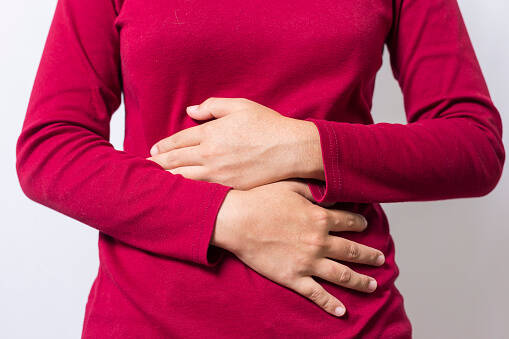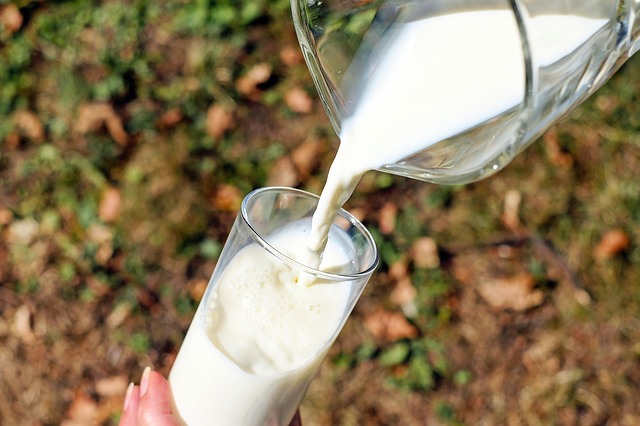- solen.sk - Lactose intolerance, one of the common diagnoses manifested by, among other things, abdominal cramping
- medicinapropraxi.cz - Irritable bowel and abdominal cramping
- medicalnewstoday.com - What can cause stomach churning?
- medicalnewstoday.com - All you need to know about stomach growling
- netdoctor.co.uk - Why does your stomach rumble?
Grumbling in the abdomen: from what does it rumble in the abdomen, even loudly and for a long time?

Abdominal rumbling is a natural part of everyday life. It is primarily a manifestation of the digestive system. Sometimes it can be too loud.
Abdominal cramping is a natural part of everyday life. It is a manifestation of the digestive system and hunger at the same time.
In some cases, a louder manifestation occurs, which can surprise a person and his surroundings.
You often ask:
Can cramping be a sign of a health problem?
Or is it just a symptom of our bowels working?
Is prolonged cramping a problem?
Is loud cramping after eating normal?
My bowels are overflowing, why?It is also known professionally as borborygmus.
Gagging as a manifestation of the digestive system
The digestive system starts with the mouth and ends with the anus. These two parts are connected by a tube which has different parts.
In the mouth, we use the teeth for primary processing. We use them to divide food into smaller parts, chew it.
Once the bite is formed, it passes through the pharynx into the oesophagus. From there, into the stomach and on to the small and large intestines.
The wall of the alimentary canal is partly made up of a layer of muscle. This helps move the food down the oesophagus. Everything gets mixed in the mouth and later in the stomach.
The movement of the alimentary canal and the intestines is called peristalsis. It is controlled by the autonomic nervous system. The will of the person has no influence on the control of the intestines.
In the stomach, all the components of the diet are combined and subject to further processing.
The chyme is formed, which is the digestion of the food.
In addition to solids, liquids, digestive juices, stomach acid, air is added.
The air is swallowed along with the food.
In addition to this air, other gases are formed during digestion.
The gas in the alimentary canal comes from three sources:
- swallowing while eating - aerophagia - swallowing air
- neutralisation of digestive acids, producingCO2
- fermentation (a process and activity of micro-organisms) due to the intestinal microflora - bacteria that normally populate the intestine, which also produces methane or hydrogen
The gas is partially absorbed by the intestine and naturally escapes from the body when burping through the mouth and anus, as a gas outlet.
Gas outlet:
technically flatus
colloquially farting
Intestinal gases contain 90% nitrogen.
The rest is carbon dioxide, methane or hydrogen.
Normal gas expulsion is said to occur if a person drops gas about 12 times during the day.
Excessive expulsion is said to occur 25 or more times during the day.
During sleep, approximately 100 ml of gas is expelled in one hour.
When there is excess accumulation, this condition is referred to as flatulence or gas and bloating. In this case, we may observe and feel a bloated and painful abdomen.
During the movement of the bowel contents, a sound, i.e., gurgling, is also produced.
The rumbling in the abdomen is caused by the mixing of mushy contents, liquids and air. The more air it contains, the more intense and louder the sound.
+
The air, along with the harder contents, spills over and moves through the intestinal villi and constricts the digestive system.
This is a normal, normal, physiological manifestation of the activity of the digestive system.
A manifestation of digestion, but also of hunger
In addition to the fact that the digestive tract shifts and makes sounds, belching is a manifestation of hunger.
Hunger is a signal we use to receive information about the state of our gastrointestinal system (GIT).
Approximately 2 hours after the stomach is emptied, the tube is stimulated, which helps the intestinal contents to advance and prepare the way for the intake of more food.
The stomach sends a signal that it needs to eat again.
The rumbling of the stomach and intestines is therefore also a signal of emptiness, of hunger.
The less food there is in the stomach, the more air there is in it.
And the more air there is in this tube, the louder the gagging becomes.
Stress, mental, psychological stress
The body and the psyche are closely linked. The relationship between the digestive system and mental condition has been known to us for a long time.
Probably everyone remembers ongoing stomach and digestive problems due to stressful situations at school or before a first date.
A heavy stomach, sometimes almost diarrhea, and an absolute lack of appetite.
This is also the case when one experiences prolonged stress.
Workload, disagreements between partners, any stressful life situations that affect our psyche also affect the digestive system.
As a result and as an example, a functional problem known as irritable bowel syndrome can occur. This includes various digestive disorders which, in addition to abdominal pain and cramps, nausea and lack of appetite, also include, for example, frequent stooling, diarrhoea and even constipation.
Read more about Irritable Bowel Syndrome
One of the symptoms of a stressful period and an overload not only of the psyche but also of the GIT is the rumbling and various other noises in the abdomen.
The bowel movement is accelerated, as well as the passage of digested food, i.e. the whole peristalsis.
Repeated urge to stool (especially morning stools), distended abdomen, overflowing bowels and their excessive sounds and abdominal discomfort.
How to avoid them?
Answer.
Excessive and unnecessary stress should be relieved. Over time, improvement should occur.
However, coping with life situations sometimes requires the professional help of a psychologist or psychiatrist...
A change in lifestyle, eating habits and a suitable form of rest, relaxation, holidays, sports and physical activities, company or other events are sufficient.
Beware of alcohol, as it may aggravate the problem.
Diet and intolerance
An allergy is an overreaction of the body to a substance that is not normally dangerous.
More precisely, it may be an intolerance.
Example:
- lactose intolerance - hypersensitivity to lactose or milk sugar, when there is a deficiency of lactase (the enzyme that breaks down milk sugar).
- celiac disease - a form of intolerance to gluten, a component of cereals
- histamine intolerance - intolerance to histamine, which we also ingest in various foods

So, to sum it all up:
You should also look for the cause in dairy products, milk, yoghurt, butter or cheese, for example. Or in cereal and bakery products and in the foods that are behind the increased histamine levels.
+
We are all different and individual traits vary from person to person.
That's why a professional examination is necessary for prolonged gut cramping or overflowing.
Poor eating habits and inappropriate diet
Of course, inappropriate eating habits can also produce a problem.
Example:
- eating too quickly, swallowing food and with it excess air
- eating too much food at once
- chewing gum - swallowing air while chewing
- eating spicy food
- eating acidic foods
- inappropriate food combinations
- carbonated drinks
- smoking - as a lifestyle negative
It is necessary to eat slowly, rather 5-6 times during the day, not twice and pile food. It is necessary to think about enough fiber and vegetables in the diet.
It will also help:
Not to stress. Be calm and allow yourself enough time to eat and relax.
Everyone knows that there are foods that have a natural ability to bloat. These are:
- cabbage
- beans, lentils, peas and other legumes
- garlic
- onions
- fresh bread, dumplings, white bread, cakes
- sausages
- fried food
- fatty and greasy food
- carbonated, bubbly drinks
- beer, alcohol
- coffee - excess
If a problem persists, it is possible to monitor the intake of a particular food. Then evaluate what, if any, problems it has caused.
This is also the case with histamine intolerance.

What diseases can cause croup?
In addition to these common and less serious problems, excessive, prolonged or loud croup can be a symptom of a more serious condition.
Examples of diseases include:
- GERD - gastroesophageal reflux disease
- gastric ulcers
- Helicobacter pylori
- gastritis
- gallbladder inflammation
- GIT cancer, stomach cancer, colon cancer, etc.
- intestinal obstruction - ileus
- intestinal infections, bacterial, viral, parasitic, salmonellosis, food poisoning and others
- Crohn's disease and ulcerative colitis, i.e. IBD, inflammatory bowel disease
- diverticulitis
- and others
An example of another disease can be virtually any problem that is associated with the digestive system.
Plus...
In intestinal obstruction, the intestine is forced to work against higher resistance and obstruction. It tries to push the contents further. This is when a noticeable to noisy spilling of intestinal contents may be present.
What other symptoms may occur:
- heartburn and burning in the upper abdomen
- pain and cramps in the abdomen
- nausea and a feeling of nausea or vomiting
- lack of appetite
- bloated abdomen
- hard abdomen
- overflowing bowels
- belching and flatulence
- feeling of fullness
- unexplained weight loss
- impaired swallowing
- repeated vomiting
- vomiting of blood
- black stools or, conversely, pale to white stools
- diarrhoea or constipation
- jaundice - icterus, i.e. yellow discolouration of the skin and whites of the eyes
- increase in body temperature to fever
- chills
- dehydration
Medicines as a problem
Sometimes it is necessary to include medication in treatment. And these can have their side effects.
Examples of those that can be behind this unpleasant problem are: laxatives, but also antibiotics, which also destroy your own intestinal flora, or non-steroidal anti-inflammatory drugs.
When treating with antibiotics, it is necessary to take probiotics as well.
In women, also due to hormonal changes
Changes in hormone levels are a necessary presence in women's lives. And in more cases than not, this can mean various complications in their daily existence.
Many women know the term premenstrual syndrome - PMS.
=
A condition that links the interaction of multiple symptoms with the approach of menstruation. And it is the hormonal changes that are to blame.
PMS can include:
- bloating and abdominal cramping
- nausea
- lack of appetite
- vomiting
- diarrhea
- constipation
- abdominal, lower abdominal pain
- pelvic pain
Read also the article:
What is premenstrual syndrome and how does it manifest itself?
Heavy menstruation as a nightmare for many women.
+
There are many changes in women during pregnancy as well.
No, abdominal cramping is not a symptom of pregnancy.
But...
Hormonal influence and, in the later weeks of pregnancy, changes in the distribution of the abdominal cavity (uterine expansion and fetal growth) = possible indigestion.
Possible digestive problems in pregnancy are for example:
- heartburn
- reflux of stomach contents
- diarrhoea or constipation
- bloating
- burping and increased flatulence
- abdominal cramping
- nausea and vomiting
- feeling of fullness
What can help?
In the first place, it is important to discover the possible cause. Subsequently, the right approach can be chosen.
Diagnosis may include:
- medical history
- blood sampling
- measurement of body temperature
- X-RAY
- SONO
- CT or MRI
- endoscopic examination (GFS, colonoscopy and others)
In the management of many more serious illnesses, specialist care is necessary. However, this should also be supported.
Life sometimes requires some changes to attenuate difficulties that do not immediately indicate disease.
Regimen measures:
- In general, a change in lifestyle
- a balanced diet and an appropriate representation of food components
- eating 5 to 6 times a day and smaller portions
- indulge in good quality food rather than semi-finished and fast food
- not eating fatty foods, preferring vegetables and suitably prepared meat
- eliminating inappropriate diets for IBS and food intolerance
- probiotics and fibre in food supplements
- sufficient drinking
- avoid stress and mental strain
- managing stress levels and mental hygiene
- sufficient exercise and appropriate sports activities, possibly walking and hiking
- rest and relaxation
- not smoking or drinking alcohol
- less coffee - for those who drink a lot of coffee and have a problem with it
Several natural treatments
Diseases with symptom "Cramping in the abdomen"
Interesting resources










